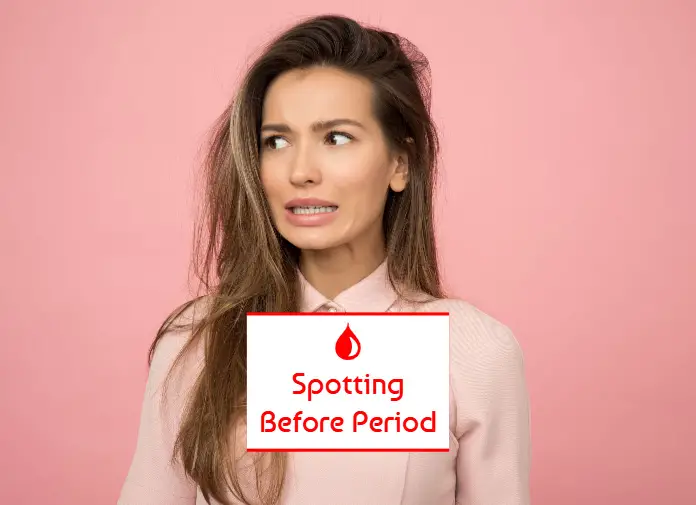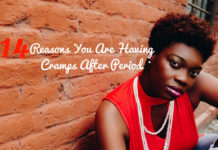Spotting about two weeks before period is mostly because of ovulation. Spotting a week before period is due to implantation. There can be many reasons for spotting before period other than implantation or ovulation.
Infections and even sudden change from an emergency birth control can lead to spotting before period. Serious reasons for spotting before period include polyps and other cancerous growths. Women with irregular period cycle also spot before period. There is no myth in that eating very spicy food, intoxicating drinks, and other junk can also cause irregular spotting.

Spotting makes you worry before wearing your favorite white outfit and going to the loo to check your panties is an unnerving experience. It is a norm every month few days before period, but it must give either conclusion of being on period or not having it.
When you have spotting before period, it is perplexing and is nerve-racking thinking about pregnancy or health concerns.
Spotting Between Periods
A normal menstrual cycle must be of 28 days. When girls have their first period or menarche, they may have longer cycles. Menstrual flow lasts for 4-5 days or longer. Beyond five days, the flow reduces, and you reach a point where you experience spotting. Similarly, when your period starts, you experience a slower flow for a few hours and then it increases. This is generally accompanied by the first day period cramps and pain and suffering.
What is spotting before a period?
Bleeding and spotting vary in color, quantity, and timing.
Bleeding during period occurs after two weeks from ovulation when the lining along with egg comes off.
Spotting, on the other hand, can occur at any time. It is pink, orange or dark like brown discharge. Bleeding before period can either be an early period or spotting before your period.
Unless there are chances of probable pregnancy, spotting a week before period is not normal. Spotting before your period can be a side effect of contraceptives.
Different colored such as orange spotting before period is mostly because of some infection such as candidiasis.
Your doctor may use any tests such as PAP, blood test or ultrasound to find out the cause of early spotting.
Brown spotting before period
For women who are expecting to get pregnant brown discharge is the most likely symptom. Brown spotting four days before period is what implantation bleeding looks like. The blood is so less in the amount that it takes longer to travel out and becomes brown.
Brown spotting a week before period is also implantation spotting. Sexually transmitted diseases or other infections can also lead to bleeding that appears like brown spotting day before period.
Major 35 reasons for spotting before period
1) Menarche
When you have your period for the first time, the hormones tune to the new cycle. As the body incorporates this new monthly incident, it needs time to adjust the clock. Most teenage girls take months to get regular cycles. If you are in the sexually active phase, then this takes longer because the contraceptives interfere with it. It is natural and will get normal soon within few period cycles. You don’t need any special prescription unless you’re having frequent spotting. After menarche, you must get a doctor’s appointment and get a regular gynecological checkup.
2) Perimenopause
Just like the girls on the threshold of the beginning of the reproductive phase, women taking an exit also experience the same. During perimenopause and menopausal stages, the levels of hormones such as estrogen dramatically reduce. The sudden drop causes spotting. You can continue to have spotting even after menopause. Sex after menopause also leads to spotting because the walls of the vagina become thin.
3) Operation of the reproductive tract
Any operation of the reproductive tract such as tying of tubes or getting a polyp removed can cause spotting before period. Factually, this spotting or bleeding has no relation with a period. But even if one gets blood suddenly after months from surgery, it could be because of it. There is no reason for panic if it is mild spotting. Symptoms such as cramps and pain signal the need of getting medical assistance.
4) Endometriosis
The ingrown tissues of the uterus invade the other regions. It leads to a reduction in the space between and for other organs. It is a cause of spotting before period. The growing tissue irritates the lining of other surrounding regions. If it continues to rub against vagina, then it can cause a release of blood from the small capillaries present in the wall.
5) Ovarian cysts
Cysts present in the ovaries obstruct the path of ovulation. They can twist and even pinch off from the ovary wall. It causes excruciating pain and bleeding. As the cysts in ovaries are not very big and so you only see spotting. If you have spotting before period along with unbearable pain, then you must immediately consult your doctor.
6) Atrophic vaginitis
It is the condition of thinning of the wall of the vagina due to the decline in the levels of estrogen. It generally happens to women who are in the menopause or perimenopause stage. The wall becomes sensitive and can bleed upon the slightest rubbing. Sex while having Atrophic Vaginitis can cause bleeding.
7) Reduced estrogen
Estrogen and progesterone levels are responsible for maintaining the thickness of the wall of vagina and pregnancy if it occurs. The levels of estrogen fall during ovulation days as the luteinizing hormone shoots a peak. During this phase, there can be spotting. Estrogen also falls in case women are undergoing menopause or taking any drugs that interfere with its production. Artificial supplements of hormones also cause fluctuations such as those present in contraceptives.
8) Pregnancy Spotting
During pregnancy, there are many stages where spotting may occur. There is no need to panic, but it is best to consult a doctor. Pregnancy breakout bleeding is the spotting that occurs at the time of the expected period. All this occurs in the first trimester of pregnancy which is the most fragile period. A mother to be may yet be unaware of her pregnancy and can consider such spotting as a sign of the arrival of her period.
9) Implantation
After the zygote begins developing it takes nutrition from the yolk sac. Beyond a developmental milestone, it needs to switch to placental nutrition transport. The blastocyst attaches to the wall of the uterus during the process of implantation. The protrusion of the bunch of cells cause bleeding from the wall of the uterus and this comes out as implantation spotting. It is not necessary that every woman who is pregnant experiences implantation bleeding. As also implantation occurs a week before period but the blood can take longer to come out of the vagina.
10) Ovulation
Ovulation spotting is less common but may happen to some women. During ovulation hormone levels interchange. The fertility period lasts from 3 days before ovulation to a day after it. During this phase, there can be bleeding. The vagina becomes softer and there is a lot of cervical mucus production. Rough sex during this time when the vagina is soft can also lead to spotting.
11) Delayed ovulation
When you are sick all your secondary survival processes take a back seat. Reproduction is not essential for survival so the processes slow down to divert energy. Even long-term flu is enough to delay your ovulation. If ovulation occurs very close to your period date, naturally you’ll not have menstrual flow at that time. But you may have spotting which appears before period spotting.
12) Early period
Just like delayed ovulation, you can get your period early. In fact, the menstrual cycle cannot start exactly on the same date every month, because it is of 28 days. We follow a calendar that has months of 30 days, so getting period earlier is normal. Again, in that case, you can have spotting at the start. If your diet lacks certain elements then also you can get late or early period spotting.
13) Period getting over
After period gets over it is not a cork that closes the vagina. You have gradually reduced blood flow. The first few days the blood flow is heavy and later on, you can have spotting. It may happen that you have spotting too late that you don’t associate it with your last period.
14) Fertility Drugs
Any prescription such as fertility drugs that interferes with normal hormone balance can cause bleeding. Undoubtedly if the drug is successful then it can lead to implantation spotting.
15) Contraceptives
When you start taking pills or stop them the body takes time to adjust. For women who take continuous birth control where they don’t allow to menstrual flow for three months, spotting is common. Even if you miss a contraceptive unintentionally your period spotting will start. That is the general working of monthly pills, which have to be stopped for 7 days for allowing periods to occur.
16) Emergency contraceptive
Just like regular birth control pills, emergency contraceptives can cause bleeding. They have a higher dose of hormones. When you take emergency contraceptives there is a sudden peak of those hormones that have adverse side effects. Acne, body heat and spotting are common consequences of consumption of birth control pills.
17) End of contraceptive implant lifetime
For women who want long-term contraception, they can get implants under the skin. These implants have hormones and ions that keep realizing in equal doses. They have a lifespan of about 3-5 years. When the implant expiry arrives, the function reduces to some extent and can cause withdrawal effects like spotting. Even during its lifetime there can be spotting.
18) Stress
The most underrated and hidden cause of infinite diseases stress can cause spotting before period. In fact, while the physiological factors have an evident effect, this often goes unnoticed. When you are under stress your fertility is greatly compromised. It is of utmost importance that you keep a check on the unnecessary mental strain you put yourself in.
19) Thyroid imbalance
Low levels of thyroid hormones can also lead to spotting before period. It slows down metabolism, changes body temperature regulation and affects fertility. You must get yourself checked for thyroid if you experience fatigue often, hair loss, and weight gain. These are the most common symptoms of hypothyroidism.
20) Sex
First coitus leads to bleeding and rough sex without enough lubrication can cause bleeding at any time. If you or your partner has a history of infections such as yeast infection, then the chances increase. Even if you experience bleeding after sex or spotting after sex before period it is not necessary that you are pregnant. Dry vagina and low cervical mucus can cause spotting after sex.
21) Change in sleep pattern
Just like stress, sleep deficiency affects fertility. It is important to get the minimum hours of sleep every day. Compromising on your sleep or food not only affects the primary functions if body but affect fertility. Erratic spotting and irregular period are two consequences of sleep deficiency. Untreated insomnia can also cause such incidents.
22) Chronic illness
Any chronic illness such as diabetes, hypertension or even obesity that runs in family can affect reproductive health. Mental depression or anxiety disorders also interfere with normal physiological processes. Spotting erratically or bleeding before the due period is a consequence of such long-term disease. Even after treatment of the primary cause, it takes longer for the alignment of normal functions.
23) Vaginal shock or trauma
Masturbation using sharp objects, or inserting anything roughly inside your vagina can cause spotting. Even a sudden jolt can cause spotting before period. Even a tampon, when forced into a dry vagina, can cause spotting. This is mostly true for women who have sex as feast or famine. A vagina can stretch and retrace back. So you need to use lubrication when it has long been in the same position.
24) Miscarriage
An impending miscarriage or early stage of actual miscarriage causes spotting. When your pregnancy aborts then blood doesn’t gush out immediately. At early stages, you have spotting especially in case of very early miscarriage. Even if a miscarriage is yet to occur, spotting is a sign of impending miscarriage. Other symptoms you’ll experience along spotting are chest burn, vaginal discomfort, cramps, and pain.
25) Ectopic Pregnancy
When the blastocyst doesn’t implant in the uterus and instead sits in the wall of tubes it is Ectopic pregnancy. The tubes are not the normal site of pregnancy growth. They cannot hold the baby cells and eventually there is a miscarriage. Before pregnancy terminates there are adverse symptoms of bleeding, cramping and bursting of tubes in extreme cases. These consequences can start before period as you’ll have a missed period symptom.
26) Post Partum spotting
Your vagina during childbirth undergoes a massive expansion and perineal tear that takes longer to heal. Also, you’ll not have a period after childbirth for about 6 months if you are breastfeeding. Even in that case, you will have bleeding and spotting at random stages. It’s normal and your doctor must have already informed you about it.
27) Dietary loopholes and eating disorders
Spotting is common in case of women suffering from deficiencies. Eating disorders such as Bulimia and Anorexia also have this as a consequence.
28) Urinary tract injury
Invasion of the uterus by urinary tract organs such as prolapse of the urethra can lead to spotting. A small amount of blood oozes out due to the injury from the vagina. This comes out as spotting. You’ll have pain and burning during urination.
29) Urinary tract infection
Any infection or inflammation of the urinary tract can lead to internal bleeding. The organs are in close proximity and it can happen that you confuse the two. A urinary tract infection can also spread to other regions depending on the severity.
30) Prescriptions or blood thinners
Blood thinners given during dialysis or drugs for obstructive disorders such as clots in veins or arteries can cause spotting. Other prescriptions such as Heparin or Warfarin or Aspirin have side effects of spotting. Antidepressants and anti-inflammatory drugs also have spotting as a side effect for women.
31) Sexually transmitted diseases
Venereal diseases have symptoms of spotting and foul smelling discharge. Red blisters can rupture leading to spotting that doesn’t need a panty liner. Chlamydia, Trichomoniasis, and Gonorrhea are the most common STDs that have such symptoms. If you see such spotting along with itching after having unprotected sex you must visit your doctor without further delay.
32) Cervical inflammatory disease or PID
Cervicitis or vulvovaginitis or any other inflammation, the pelvic inflammatory disease makes the skin of the area sensitive. The vaginal wall bleeds during such infections. Even after the infection subsides, the symptom of spotting can reoccur at different times.
33) Anal bleeding or rectum bleeding
Before testing for spotting before the period you must be sure that it is from the vagina. Anal bleeding or blood coming from the rectum can look like it is coming from the vagina.
34) PCOS
Polycystic Ovary Syndrome (PCOS) or ovarian cancer or other tumors can lead to spotting. These diseases affect the menstrual cycle and can even lead to complete absence of period, Amenorrhoea.
35) Adenomyosis
The wall of the uterus becomes thick and bleeds like normal endometrial lining. However, the size of uterus increases and it is painful to have an enlarged uterus. It is non-cancerous and mostly happens to postmenopausal women.
When to see a doctor for spotting before period?
Mostly you don’t need to see the doctor if you had spotting without any accompanying symptoms. Even if the color of spotting is brown or pink and it does not continue you don’t need to panic.
However, if it happens for more than three cycles and has other symptoms such as pain and cramps along then you need to see your doctor. Any unexpected incident of heavy bleeding other than normal period requires you to get a doctor’s appointment.









